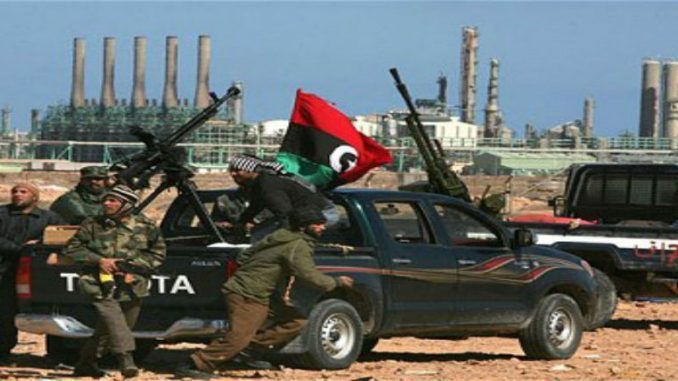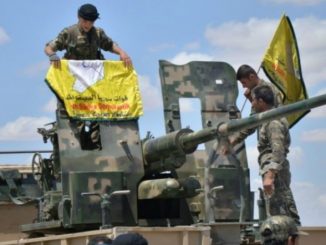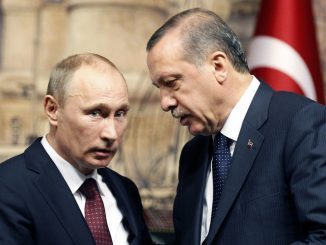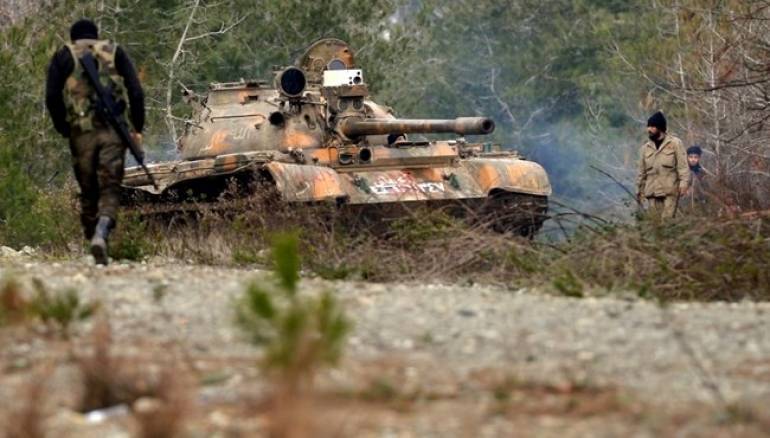
The Libyan National Army (LNA), militias loyal to military strongman Khalifa Haftar announced the recapture of two key oil installations last week.
In eastern Libya, the LNA said they recaptured two oil ports, Sidra and Ras Lanuf, from the Benghazi Defense Brigades (BDB) – a mix of militias that include Islamists – that seized them earlier this month.
Forces loyal to Haftar mounted a day-long assault by land, sea and air in order to retake the oil export terminals.
Pro-Haftar forces spokesperson Ahmed al-Mesmari said,”The armed forces… have liberated the whole of the oil crescent.”
On the other hand, Benghazi Defense Brigades (BDB) has issued a statement reassuring that it is still holding firm onto the positions it has seized in the vicinity of the area it has located itself at after handing over the oil terminals to the Petroleum Facilities Guard of the UN-proposed government and after it had withdrawn to save the lives of its fighters as well as the oil depots at the terminals.
The statement added, “We are now positioned at an area away from the ports, which were bombed by Egyptian aircraft that were sent to bomb Libyan resources in support of Haftar.”
The BDB also indicated that its forces will go on in their operation to return to Benghazi and break the siege on the trapped families in Ganfouda, adding that the current course of events can only make them stronger to fight wrongdoing and persecution.
The BDB remarked, “This statement comes after our forces have made great victories on the military levels by freeing the oil terminals from the forces of Khalifa Haftar and the mercenaries of the Sudanese rebel movement, Justice and Equality.”
It also added that on the political level, the BDB made a great victory by handing over the oil terminals to the PFG(forces affiliated to the GNA), while on the social level, the BDB managed to strip off the truth about Haftar, “the war criminal” for the locals of the eastern region as they backed the right of Benghazi IDPs to return to their houses against the will of Haftar.
Russia’s Entrance to the Libyan Arena
In recent months, Russia became more involved in the Libyan arena.
Russia is backing Gen. Khalifa Haftar, who leads a coalition of eastern-based forces allied to the House of Representatives in Tobruk known as the Libyan National Army (LNA).
Recent media reports claimed that Russia sent troops to Egypt, eyeing a Libyan role. In an Exclusive report, Reuters cited US, Egyptian and diplomatic sources saying that Russia appears to have deployed special forces to an airbase in western Egypt near the border with Libya in recent days.
The US officials, who spoke on condition of anonymity, said the United States has observed what appeared to be Russian special operations forces and drones at Sidi Barrani, about 60 miles (100 km) from the Egypt-Libya border.
Egyptian security sources offered more detail, describing a 22-member Russian special forces unit, but declined to discuss its mission.
They added that Russia also used another Egyptian base farther east in Marsa Matrouh in early February.
Media reports wasn’t confirmed by either the Russian or the Egyptian governments.
On the other hand, Russian analysts said that Moscow is ready to step up its support to Haftar’s forces in Libya’s eastern region and get a foothold in North Africa, “but it will not deploy its military there.”
A Moscow-based military analyst, Pavel Felgenhauer said “Russia’s relationship with Haftar is the result of a very simple equation. Russia backs Egypt, Haftar’s main supporter.”
Felgenhauer added, “General Haftar has declared war on terrorism and this coincides with Russia’s main objective in the region: wiping out the terrorist threat posed by the Islamic State.”
Felgenhauer also confirmed reports that Russia is using military contractors in Libya, saying that it is part of a consolidated trend in recent conflicts. He added that outsourcing the military fight helps avoid a political backlash at home.
He also said,” Russia is not sending its troops to help Haftar and is unlikely to do so in the near future. We are rather relying on private military contractors and mercenaries. We are already using contractors in Syria, where they are suffering serious losses, because they are doing the real fighting instead of Russian servicemen. Private contractors are very convenient because they have no political strings attached.”
The Russian military analyst pointed that the employment of private contractors has been facilitated by a new legal framework aimed at regulating Russian private military companies.
Moreover, Russia cannot afford expanding its military or financial capabilities due to two main reasons: the limited financial resources and because Moscow is already involved in other strategic conflicts on its doorstep.
Felgenhauer said, “Contractors are cheaper than servicemen and we need to use our financial resources as best as we can. With the conflict in Donbass simmering, Crimea, the war in Syria still under way, Russia doesn’t have the appetite or the resources to go into Libya.”
He continued, “Russia is keen on establishing a foothold in Libya and have some influence there, but committing resources is a different matter.”
Felgenhauer also said that Russia was ready to trade with Haftar” but would not offer its help for free.”
He said, “Russia may provide weaponry, military training, logistical support, but we would seek some sort of compensation. Haftar has an oil income and Russia may be ready to trade.”
The same discourse applies to Egypt, the Kremlin’s main ally in the region, according to Felgenhauer.
In the same context, regarding recent Russian media reports that the Kremlin was negotiating the opening of a military base on the border with Libya, Felgenhauer didn’t deny the reports.
He said Egypt asked for enormous economic aid in exchange for allowing a Russian military base on its soil.
In addition, in an interview published on the Russian state news service RIA Novosti, the speaker of the eastern-based Libyan Parliament, Aqila Saleh, who backs Haftar, said that the military commander had asked Russia to send experts to train troops and repair weapons.
Saleh said, “They promised to help us in the fight against terrorism .” He also offered to restore arms contracts with Russia signed by the late Libyan ruler Muammar Qaddafi, according to RIA.
Oleg Bulaev, a specialist on Libya at the Institute of Oriental Studies in Moscow, said, “The Kremlin will increase its support for Haftar, including by deploying military advisers and permitting shipments of Russian weapons from Egypt, though it won’t directly violate a UN arms embargo on Libya.”
A Tug of War in Libya
Haftar’s forces recaptured Ras Lanuf and El-sidra oil terminals after an offensive they launched on BDB and PFG with the assistance of heavy airstrikes.
Haftar reigned back the oil terminals after media reports of a Russian assistance to Libya’s strongman via Egypt.
Moreover, the BDB claimed that Egypt has gave a hand to Haftar to regain the oil terminals as it said in its statement that ports were bombed “by Egyptian aircraft that were sent to bomb Libyan resources in support of Haftar,”according to Libya Observer.
Although the news wasn’t confirmed, but there is a strong indication that both Russia and Egypt had played a decisive role in assisting Haftar’s forces to recapture the oil terminals.
Days before Haftar took control of oil terminals, a military emergency meeting was held in Cairo.
An Egyptian diplomatic source said that Haftar was invited to attend an emergency military meeting in Cairo, also set to include Russian and Emirati representatives, in the coming days, according to the New Arab.
According to the diplomatic source, the meeting was headed by the chief of staff of the Egyptian Army Mohammad Hegazi to develop a clear vision to enable Haftar to retake al-Sidra and Ras Lanuf.
Earlier this month, Benghazi Defense Brigades (BDB) took control of Ras Lanuf Airport in central Libya, in addition to Ben Jawad and Nofaliya towns, in a surprise attack on LNA, forces loyal to Haftar, there.
The BDB has handed the oil installations it had captured back to the GNA.
Last September, pro-Haftar forces had captured the oil terminals and two other eastern oil ports in a blow to the authority of the UN-backed unity government in Tripoli.
In fact, controlling these ports brings political leverage, as well as the proceeds of any oil sales.
The lion’s share of Libya’s oil exports is concentrated at are four ports along the “Oil Crescent” on the eastern part of the Gulf of Sirte.
The exports from the four ports constitute the main source of hard currency income and without them, Libya’s once huge currency reserves are being rapidly depleted.
Oil accounts for more than 95 % of Libya’s revenues.
Therefore, the LNA announcement that it had retaken the ports from the Benghazi Defense Brigade (BDB) won’t guarantee to end of the ‘tug of war’ over them.
Moreover, the presence of many players as well as the entrance of Russia on the Libyan arena don’t suggest a possible end to the Libyan crisis in the short term.
In addition, many observes believe that the recent rival conflict on the oil fields has accelerated the collapse of any meaningful channel of communication between the east and west of the country.
Will Haftar be Brought to Power?
It seems that western countries are too divided now to even think of negotiations for a comprehensive deal with Haftar especially after he recaptured the oil terminals.
In addition, Haftar has had strong backing from Egypt and the United Arab Emirates, with neighboring countries like Algeria and Tunisia also sympathetic to his cause of war on terrorism.
The emergence of Russia as a backer, first signaled by Haftar’s visit to Moscow in December 2016, has strengthened his position.
Russia, which is emboldened by its apparent success in Syria, is said to view backing Haftar as a way of re-establishing influence in North Africa.
Among the western powers, France has given Haftar some support. Italy, which has close ties with militias based in the city state of Misrata, is hostile to him.
Regarding the new US Administration, there was speculation that it might be persuaded to ‘change sides’ and give its wholehearted support to Haftar. However, this has not happened yet.
There are reportedly high suspicions over Haftar in the State Department and Pentagon and it is not clear whether the US will ever accept that Russia has a legitimate role to play in Libya.
Last week, the top U.S. military commander overseeing troops in Africa, Marine General Thomas Waldhauser, stated in front of the U.S. Senate that Russia was trying to exert influence in Libya to strengthen its leverage over whoever ultimately holds power.
Waldhauser told the Senate Armed Services Committee, “They’re working to influence that.”
When Waldhauser was asked whether it was in the U.S. interest to let that happen, Waldhauser said, “It is not.”
According to a U.S. intelligence official,” Russia’s aim in Libya appeared to be an effort to “regain a toe-hold where the Soviet Union once had an ally in Gaddafi.”
The official, who spoke on the condition of anonymity said,” At the same time, as in Syria, they appear to be trying to limit their military involvement and apply enough to force some resolution but not enough to leave them owning the problem.”
Moreover, when Waldhauser was asked by U.S. Senator Lindsey Graham whether Russia was trying to do in Libya what it did in Syria, he said, “Yes, that’s a good way to characterize it.”
While backing the GNA, the UK has also sought to maintain relations with the Misratan militias and Haftar.
However, Britain’s ambassador to Libya met Khalifa Haftar as his forces claimed victory in a long battle for control of the country’s oil crescent.
It is unclear who initiated the meeting which was scheduled 48 hours after the LNA recaptured the Ras Lanuf and Sidra oil export terminals.
Peter Millett, the British ambassador, reportedly met Haftar in Benghazi, days after Haftar was also received by members of Britain’s ruling Conservative party.
According to the Libya Herald, Millett flew in specifically to meet the general, and met no one else.
Millett said the meeting was “satisfying and useful” and part of “programme of outreach” by British officials.
He added, “This was a positive meeting and part of the UK’s wider diplomatic outreach to promote stability in Libya through peaceful dialogue and to encourage all Libyans to work together to alleviate the suffering of the Libyan people.”
In October, Millett said he wanted Haftar to be part of Libya’s national reconciliation process.
The Libya Herald reported a high-ranking Libyan National Army source as saying Millett expressed regret that much had been said about the UK’s apparently negative role in Libya.
It is worth to mention that UK feels suspicious about Russia’s involvement in Libya.
On February 2017, the Secretary of State for Foreign and Commonwealth Affairs was asked about recent reports on whether President Putin has endorsed support for General Khalifa Haftar to be the future leader of the Libyan state.
He was quoted saying that UK welcomes all diplomatic efforts, in support of reconciliation in Libya within the framework of the Libyan Political Agreement (LPA) and the relevant UNSCRs.
“An inclusive political deal” negotiated within the framework of the LPA is the best way of stabilizing Libya but it is ultimately for Libyans to decide what is acceptable for them. He added, “We recognize that Khalifa Haftar has a role to play in the political process, but there can be no military solution. The LPA is clear on the need for civilian oversight of military structures.”
In the end, although many western diplomats considered Haftar to be “a strongman who just isn’t strong enough”, however, Haftar would be now an unavoidable part of the solution as a consequence of Russian backing for him.



